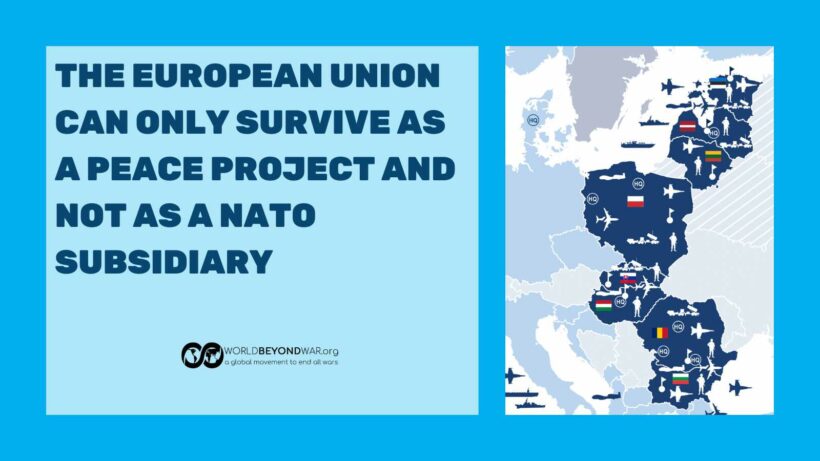EU Leaders, Stop the Warmongering!
By Florina Tufescu
The most recent poll commissioned by the European Council for Foreign Relations (an influential think tank that employs numerous leading politicians, EU officials, and former NATO secretaries general) shows that 41% of European citizens would prefer for Europe to put pressure on Ukraine to engage in negotiations with Russia, as compared to 31% who favour continued military support. Yet the conclusion of the poll analysis, coauthored by the director of ECFR, is not that European leaders should pay any attention to citizens’ views, but simply that they need to repackage and refine their message, stressing the preferability of the “durable peace” to be achieved through continued fighting over the actual peace that could be achieved right now through negotiations.
We know from the head of the Ukrainian delegation and leader of the Servant of the People’s Party David Arahamiya that Russian negotiators “were ready to end the war if we took – as Finland once did – neutrality.” This was rejected due to the lack of security guarantees and on the grounds that the intention of joining NATO was written into Ukraine’s Constitution. A subsequent round of peace talks in April 2022 was allegedly sabotaged by the UK and the U.S. according to multiple sources, which once again include the Ukrainian spokesman.
No peace negotiations have been attempted since, probably because the risk of their succeeding has been too great. The war needs to go on to justify the expansion of the U.S. and EU military industries. Total military spending by NATO, which is supposedly a ‘defensive’ alliance, has reached an all-time high of USD 1,100 billion in 2023 while military spending by Central and Western European countries as self-declared champions of democracy and peace is also at its highest ever, i.e. USD 345 billion already in 2022 according to SIPRI. By comparison, Russia, a dictatorship that is directly involved in war, spent USD 86.4 billion on the military in 2022 according to SIPRI.
The war in Ukraine has already resulted in hundreds of thousands of lives lost since February 2022, millions of refugees and 30% of Ukrainian territory contaminated by mines. This tragedy cannot be allowed to continue purely to justify the growth of the weapons industry, which EU leaders now seem determined to make a key one, with Internal Market Commissioner Thierry Breton asking for another EUR 100 billion of military funding on top of all the existing commitments at EU level and at the national level by the European countries that are also NATO members. Much like the grieving walrus of Lewis Carroll’s poem, the EU and NATO leaders put on their gravest faces in stressing the inevitability of war preparations while in fact doing nothing to reduce the conflict and being nonchalant about the risk of nuclear escalation.
The possibilities for ending the war are already known and were discussed in the Minsk agreements and in the Istanbul peace negotiations. They would have to include Ukraine’s neutrality and the guarantee of Russian minority rights in Ukraine, which would be a far more effective means of undoing Putin’s influence than the sending of additional weapons.
In addition, the EU should support conscientious objectors from Russia, Ukraine and Belarus. The right to conscientious objection, upheld by article 9 of the European Convention on Human Rights and by article 18 of the Universal Declaration of Human Rights, is not currently recognised by Ukraine and, albeit legally recognised in Russia for non-military personnel, it is disrespected in approximately 50% of cases according to the European Bureau for Conscientious Objection. Fewer than 10,000 of the estimated 250,000 Russians who have fled their homeland to avoid conscription have been granted asylum in the EU, despite the appeal made by 60 organisations already in June 2022 (EBCO annual report, p. 3). So this path to peace has not been pursued, presumably because refugees put a strain on the economy without profiting any powerful clique, whereas the military industry is highly profitable for certain people and exerts an ever greater influence on EU policies, as revealed in the Fanning the Flames report published by the Transnational Institute and the European Network Against Arms Trade and in the ENAAT report “From war lobby to war economy“.
It is high time for EU leaders to recover some shred of credibility by showing they are willing to make at least a modest investment in peace and peace negotiations in parallel with the unprecedented investment in war preparations. It is high time for EU leaders to place the interests of European citizens and of human beings in general ahead of those of the weapons industry.










